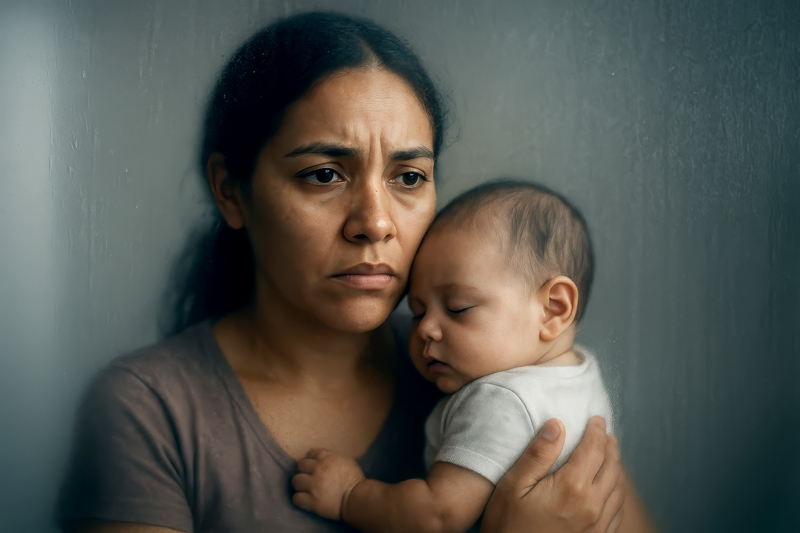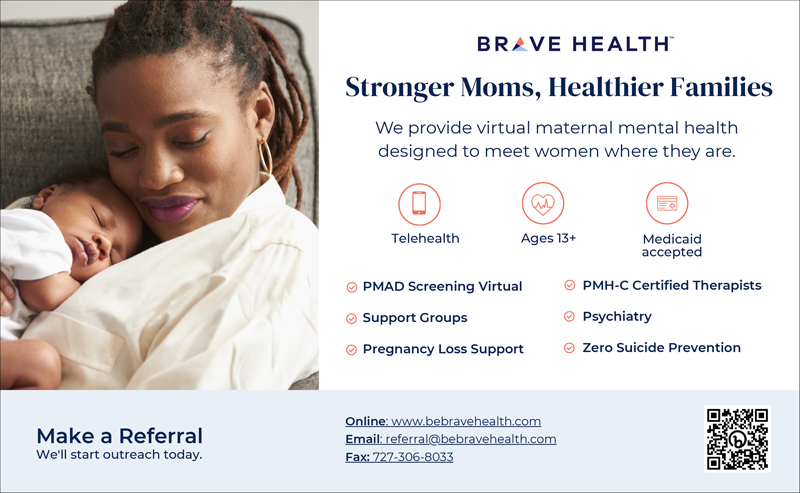There’s a shared assumption in health care that if we make services more accessible, patients will use them.
It’s the foundation of many well-intentioned interventions: Add depression screening to the six-week postpartum visit, embed a therapist in the OB/GYN clinic, expand access through telehealth—and mothers will use these services.

But when it comes to maternal mental health, access is only half the battle. Even when screening tools flag symptoms. Even when a therapist is just a few clicks away. Even when a provider offers help in a warm, nonjudgmental way—internalized stigma can stop a mother from saying yes.
It’s Not Just Stigma—It’s Identity
When we talk about stigma, we usually think of external judgment. Internalized stigma happens when we absorb cultural narratives about mental illness and motherhood—and turn them inward. It’s different from the fear of being judged by others. It’s the fear that those judgments are true.
For mothers, that lie hits especially hard—because it messes with our core identity. We’ve been taught that a “good mom” takes care of everyone in her orbit, selfless and emotionally bulletproof. Social media has created distorted windows into the lives of effortlessly perfect moms—and punishes those who fall short. For every mom influencer with a picture-perfect feed, there’s a comment thread somewhere tearing her down.
So when anxiety, depression, or rage show up—alongside sleep deprivation, hormonal chaos, and identity whiplash—it doesn’t feel like an illness. It feels like a personal failing.
As a mother who works in mental health, I know this kind of thinking is irrational. And yet, I’ve had it myself.
I’ve lived with major depression most of my adult life, and when I became pregnant, I felt a different, deeper kind of shame—not because I needed help, but because I needed to stay on antidepressants. Even though I knew the science, even though I trusted my psychiatrist, part of me still believed that a “good mother” should be able to go without.
That’s the cruel power of internalized stigma. It doesn’t matter how much we know. It’s what we believe about ourselves that shapes our decisions.
We’re Making Progress—But Mothers Can’t Wait
Over the past few years, the federal government has taken critical steps to finally start treating maternal mental health like the public health crisis it is. The launch of the National Maternal Mental Health Hotline in 2022 was a turning point—finally, there was a free, 24/7 resource where mothers could reach out and hear, “What you’re feeling is real, and you’re not alone.”
But we can’t afford to let this progress unfold slowly. Maternal mental health conditions—including suicide and overdose—are now the leading causes of pregnancy-related death in the United States, responsible for nearly 20% of maternal deaths (CDC, 2004).
If we want these interventions to actually work, we have to stop treating maternal mental health like every other mental health issue. The stigma is different.
We tell people to “speak up” or “ask for help.” But many moms don’t feel they’re allowed to do either. They fear they’ll be labeled unstable. That they’ll be judged. Or worse—deemed unfit to parent.
And for some mothers, especially in rural areas, religious communities, immigrant populations, and communities of color, that fear is well-founded. The shadow of child protective services looms large. So does generational trauma and distrust of medical institutions.
When I served as the Project Director for the National Maternal Mental Health Hotline, we heard over and over from mothers who were told, “It’s just the baby blues.” In trying to help women understand the emotional shifts that can come after childbirth, we’ve unintentionally internalized a message that minimizes their pain. That’s why we had to start every conversation in a way that made them feel safe—not dismissed—for reaching out.
Designing for the Moms Who Say “I’m Fine”
Healthcare leaders have a challenge: How can we design systems for mothers who don’t want to be patients?
We’re not just asking women to accept treatment—we’re asking them to redefine their identity. We’re asking them to believe that vulnerability isn’t weakness. That being a mother in need isn’t the same as being a bad mother. That seeking treatment is a sign of strength, not a red flag.
That’s not something a single screening tool or referral can fix. It requires a systemic approach grounded in empathy, trust, and cultural change.
Here are a few key opportunities:
- Don’t Stop at the Screener. A yes on the Edinburgh Postnatal Depression Scale (EPDS) isn’t the finish line—it’s the first step. Providers need training to gently challenge stigma. If a mom says “I’m fine” while shaking or crying, it’s worth asking again.
- Make Follow-Up Automatic. Why put the burden on moms to schedule their own therapy when we know stigma discourages action? Leverage technology to make follow-up the default, not a one-off.
- Let Peer Voices Lead. Nothing cuts through shame like hearing another mom say, “I’ve been there—and I got better.” Integrating support groups and peer support specialists into care can normalize the struggle and spotlight the strength it takes to get help.
- Build with Communities, Not Just For Them. Stigma thrives in cultures where motherhood is sacred and mental illness is taboo. Tailor interventions with community input, especially in rural, religious, immigrant, and BIPOC communities.
I believe deeply in the power of healthcare to transform lives. But we can’t keep operating under the assumption that mothers will speak up when they need help. Many won’t. Not because they’re hiding—but because they don’t believe they’re allowed to ask.
The solution isn’t just awareness. It’s identity-affirming care. It’s helping mothers understand that treatment isn’t proof they’re unfit—it’s evidence they’re fighting for themselves and their families.
We don’t need to tell mothers to be strong. We need to create systems that make it safe for them to be vulnerable.
Ashley Womble, MPH, PMHC, is the Senior Director of Marketing & Public Affairs at Brave Health. You can learn more about her at www.ashleywomble.com and about Brave Health at www.bebravehealth.com.





